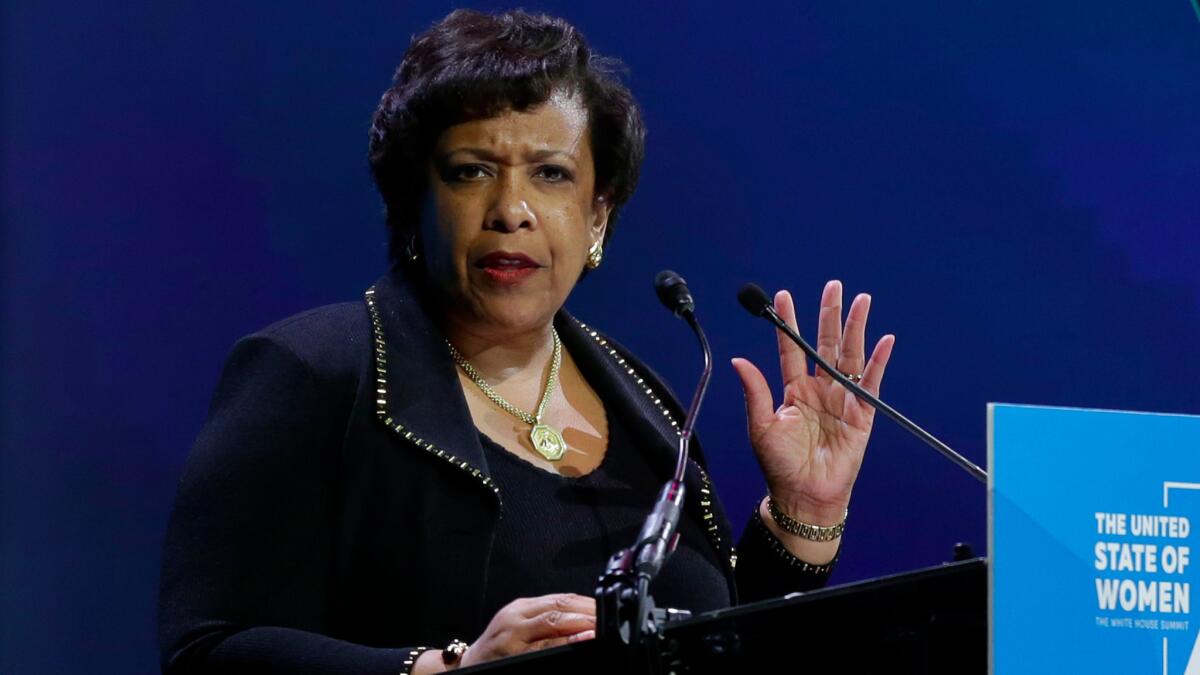Opinion: Lynch closes Clinton email probe in a way that denies closure

Moving with unusual speed, Atty. Gen. Loretta Lynch announced Wednesday afternoon that the Justice Department would not bring charges against Hillary Clinton for using a private email server for her State Department communications.
Lynch ignored calls by some (including The Times editorial board) to recuse herself from the case, and instead simply accepted the recommendation from FBI Director James Comey that Clinton not be prosecuted for her “extremely careless” handling of “very sensitive, highly classified” material. That meant the second-guessing of the FBI will shift from the legal experts at the Justice Department to the politicians on Capitol Hill.
Of course, it was headed there anyway. Senate Majority Leader Mitch McConnell (R-Ky.) had called on Clinton to release a transcript of her FBI interview, Senate Judiciary Committee Chairman Charles Grassley (R-Iowa) had urged Comey to make public every scrap of evidence it collected in its investigation, and two House committees have scheduled hearings with Comey and Lynch to discuss why Clinton wasn’t being charged.
So it probably wouldn’t have helped matters, at least from the loyal opposition’s point of view, had Lynch kept her hands off the case and let her top deputy decide whether to abide by the FBI’s judgment. If the probe resulted in anything less than an indictment, there was going to be an outcry from Republicans on the Hill. (Which is their prerogative. Besides, the line between “extremely careless” and “grossly negligent” is subjective, as is the line a prosecutor draws between a case that’s winnable and one that’s not.)
Nevertheless, Lynch shouldn’t have come within hailing distance of this one. Even her limited role gave too much material for critics to work with.
As a political appointee, Lynch has a personal interest in the outcome of the presidential election. To be sure, the next president is likely to pick a new Attorney General — that’s what a new president typically does — and Lynch will move into the private sector to make some serious cheddar. But if she is to have any chance of holding onto her current job, it would be under a President Clinton, not a President Trump. (And in fact, the New York Times reported that sources “close” to Clinton said she might ask Lynch to stay on.)
These political realities led Donald Trump to assert at a rally in North Carolina Tuesday that the decision not to charge Clinton was the result of a “bribe.” According to Time magazine’s Tessa Berenson, Trump said, “I mean the Attorney General is sitting there saying, ‘If I get Hillary off the hook, I’m going to have four more years or eight more years. But if she loses, I’m out of a job.’ It’s a bribe. It’s a disgrace.”
That was a decision not to second-guess the judgment of people who were so close to the investigation, they may have lost sight of the forest for the trees.
That’s the extremely cynical view. Yet even the less Machiavellian among us can see how Lynch and Clinton’s interests align.
Lynch framed her role as ceding the decision-making power to the FBI’s agents and the “career prosecutors” (that is, non-political appointees) who unanimously recommended that the investigation close without criminal charges. But that, in itself, was a decision not to push back, not to second-guess the judgment of the people who were so close to the investigation, they may have lost sight of the forest for the trees.
From my non-lawyerly vantage point, what Clinton did doesn’t seem criminal. Stupid, lazy and irresponsible, yes. Criminal, no. But I would feel much more confident about this if one of the DOJ’s top prosecutors had spent several days picking apart the FBI’s work before deciding that Comey was right. Lynch short-circuited that process.
I have no confidence in House or Senate committees to provide the necessary scrutiny because they start with a clear political agenda. So at the end of the day, we’re left to trust Comey’s judgment. And despite his reputation as an honest broker, I can’t help wishing for another, dispassionate set of eyes.
Twitter: @jcahealey
More to Read
A cure for the common opinion
Get thought-provoking perspectives with our weekly newsletter.
You may occasionally receive promotional content from the Los Angeles Times.











